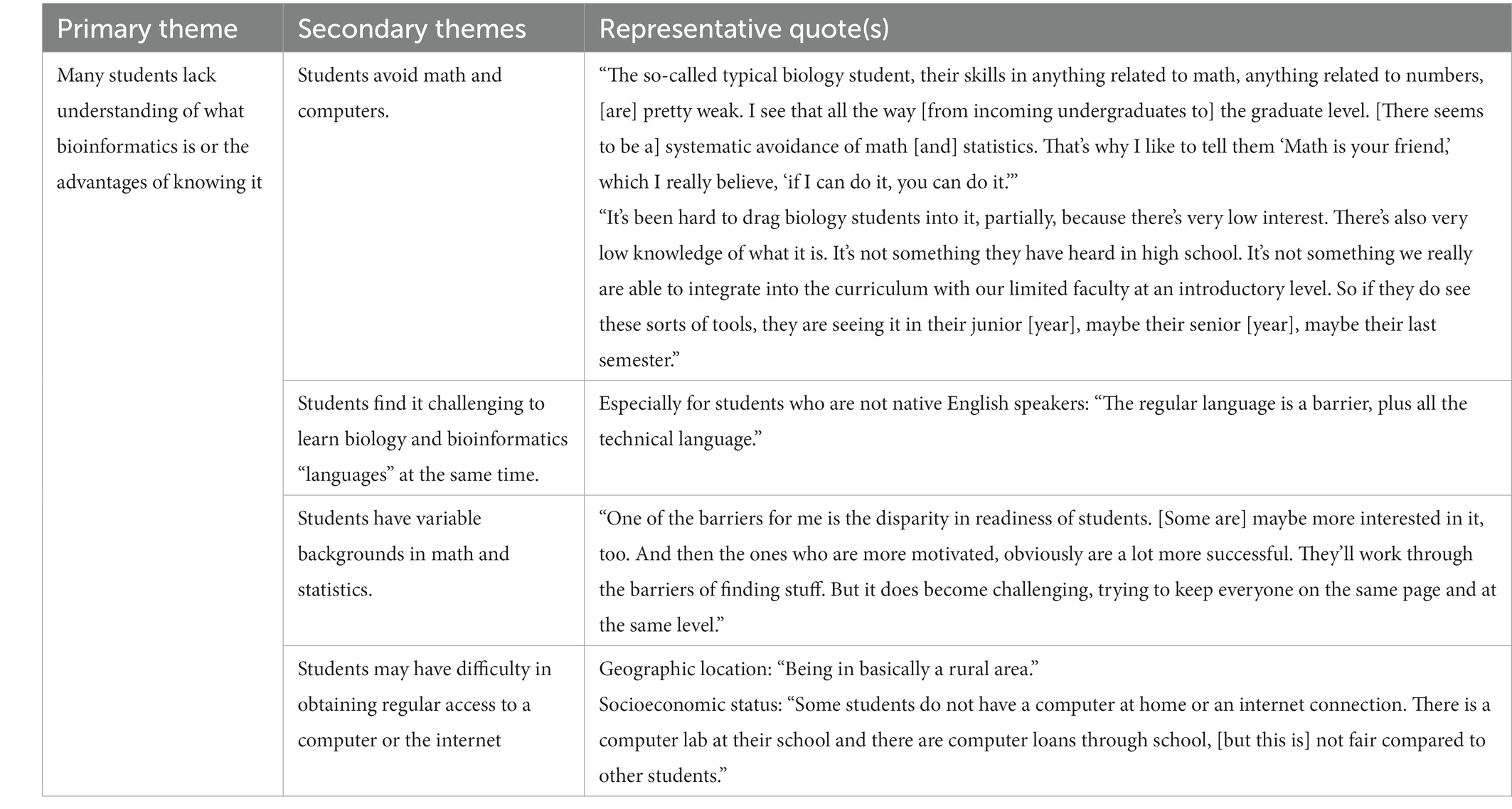Getting My Bioinformatics Tutor To Work
Getting My Bioinformatics Tutor To Work
Blog Article
Get This Report on Bioinformatics Tutor
Table of ContentsThe 9-Second Trick For Bioinformatics TutorThe Greatest Guide To Bioinformatics TutorSome Known Incorrect Statements About Bioinformatics Tutor The Buzz on Bioinformatics TutorA Biased View of Bioinformatics Tutor
Of the overall participants associated with the training, 80% were trainees from public college organizations, while the remaining 20% originated from exclusive organizations. To get approved for a certification of participation, students were required to participate in a minimum of 90% of the overall training hours. As an outcome of this demand, a remarkable 95% of the participants successfully gotten their certificates, having not only satisfied the minimum presence criteria yet likewise completed all designated tasks throughout the training.
During the height of the COVID-19 pandemic, specifically between June and August 2020, the task group was charged with arranging specialized training in bioinformatics. This training was specifically targeted at pupils from the research study group Nucleus for Research in Applied Computer at the Federal University of Pará (UFRA) The adjustment to remote understanding platforms because of the pandemic created an opportunity to explore brand-new training methods and digital devices that improved both reach and performance.
To react to the growing demand in the computer and life sciences fields, an advanced course was presented in 2020 labelled Intro to Equipment Discovering. This program was developed to provide an easily accessible yet detailed review of Expert system techniques, particularly as applied in bioinformatics. The program was performed over three months, from October to December 2020, and was provided completely online through the Google Meet platform. This virtual style made it possible for participation from trainees throughout Brazil, much of whom might not have had the opportunity to participate in in-person sessions.
The Best Guide To Bioinformatics Tutor
A notable function of this training course was its focus on hands-on knowing. Roughly 50% of the total training hours were committed to practical activities where students constructed smart versions and applications in a series of scientific domains, consisting of genes, molecular biology, and environmental data analysis. Widely made use of tools and structures such as Spyder, Google Colab, Jupyter Notebooks, and Orange were integrated right into the coursework. These systems allowed trainees to participate in real-time information control, model training, and formula trial and error.
Sixty of them were associated with different greater education establishments in the state of Pará, while the staying twenty came from establishments situated in 5 other Brazilian states. By presenting Artificial Intelligence in a functional and pertinent context, the effort offered to connect the space between concept and real-world application, providing trainees with a solid foundation for future study or employment in the field.
The training initiative formed part of a wider scholastic outreach effort referred to as the Bioinformatics on the Road project. This task has, over the years, presented dozens of trainees to the world of bioinformatics and computational biology. The occasions held under this umbrella initiative have taken place across multiple regions and years, as summarized in Table 1 (Listing of events, places, years, and total numbers of pupils and teachers)
One of the dig this most impressive end results of the Bioinformatics when traveling campaign has been its payment to the growth of decentralized study teams. Numerous of these groups, at first brought with each other by their participation in training events, have considering that gone on to create independent clinical study in partnership with neighborhood academic organizations. The training not only promoted scientific reasoning within the context of bioinformatics but also stimulated collective partnerships that prolonged beyond the training setting. These cooperations have resulted in raised neighborhood scientific performance and contributed meaningfully to the growth of the more comprehensive bioinformatics area in Brazil.
The Facts About Bioinformatics Tutor Uncovered
The same team, excluding IH and RR, also acted as tutors for the practical training modules. Financing for the task was offered through the give 88887.200562/ 2018-00 from CAPES.
The Federal University of Pará's Office of Study (PROPESP/UFPA) also gave financial support, especially for the manufacturing of the final manuscript. The authors declare no financial or industrial problems of rate of interest that might have affected the research study. Moreover, all interpretations and point of views shared in this article are exclusively those of the authors and do not necessarily reflect those of their respective establishments, the publisher, editors, or reviewers entailed in the publication procedure.

The smart Trick of Bioinformatics Tutor That Nobody is Discussing
From a pedagogical point of view, the mentor approach used in the training was deliberately interactive. Courses were carried out in a manner that urged pupil engagement and conversation, surpassing memorizing memorization to check out exactly how concepts are established, applied in life, and evaluated in academic setups. The training viewpoint concentrated on supporting both strong and having a hard time click here now trainees, giving customized assistance, and structure self-confidence through sustained mentorship and perseverance.

Each group, containing around 36 participants, was supported by 3 coaches-- a lot of whom were postdoctoral scientists with specific know-how. These mentors not only helped create the team projects yet also promoted their execution, guaranteeing that each study inquiry was both relevant and properly difficult. The goal was to offer a naturally realistic context that individuals can explore with open-ended goals and accessibility to curated datasets.
For added insights right into the technique and outcomes of this project-based discovering technique, readers are directed to S1 this link Text, that includes in-depth descriptions of the instructional framework, assessment techniques, and task styles made use of in the training sessions.
The Best Guide To Bioinformatics Tutor
Of the total participants involved in the training, 80% were students from public higher education establishments, while the staying 20% came from personal establishments. To certify for a certification of participation, students were needed to go to at the very least 90% of the complete training hours. Notably, beyond the students that signed up in the training sessions, seven seasoned teachers participated in providing the courses, while 3 devoted research study professors collaborated the total training procedure. About 50% of the total training hours were committed to practical tasks where students built intelligent models and applications in an array of scientific domain names, consisting of genes, molecular biology, and ecological data evaluation. The training not just cultivated scientific reasoning within the context of bioinformatics but additionally triggered joint relationships that expanded beyond the training environment.
Report this page